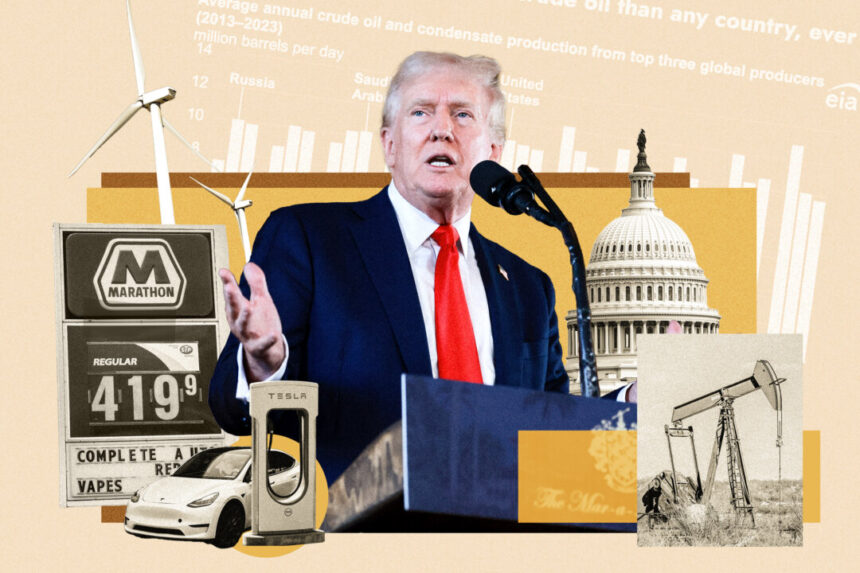Former President Donald Trump’s reelection to the presidency was welcomed by many business leaders and investors, driving the S&P 500 index up more than 2.5 percent on the day after Election Day, when his victory became apparent.
Many expect the Trump administration to enact lower taxes, lighter regulations, and reverse many signature programs of the Biden administration, including the government-mandated transition from fossil fuel energy to wind and solar, and from gasoline-powered cars and trucks to electric vehicles (EVs).
“I think a lot of CEOs in the country said enough is enough,” Andy Puzder, former chief executive of CKE Restaurants, told The Epoch Times.
“Just look at the stock market on the day after the election and you can see exactly how American CEOs and American businesses felt about Trump winning the presidency.”
Cutting Regulations
Regulatory policy is likely the area where the incoming administration could have the most immediate impact on businesses.
“Agencies like the EPA and Department of Energy regularly acknowledge in their cost-benefit analyses how energy efficiency regulations will raise up-front product costs,” AAF director of regulatory policy Dan Goldbeck told The Epoch Times.
Trump has also toyed with appointing Tesla and SpaceX founder Elon Musk to run a newly-proposed Department of Government Efficiency, with the goal of cutting $2 trillion or more from the federal budget.
“If what President Trump says about establishing a government efficiency agency with Elon Musk is in fact going to happen, and they have the fortitude to start taking a chainsaw to government bureaucracy, that would be positive for the economy long-term, but there will likely be some added pain over the short-term,” Tim Schwarzenberger, portfolio manager with Inspire Investments, told The Epoch Times.
While Schwarzenberger predicts a recession in early 2025, he says that Trump’s policies “could make that downturn less severe as he will be cutting taxes and regulations and opening up energy production, while at the same time reducing green energy programs and possibly reforming Medicaid.”
Boosting Oil and Gas Production
America’s energy industry will be the sector most heavily impacted by the change in administrations, analysts say.
“Trump is likely to remove regulations and other limits on fracking and other forms of energy production, which would be good for oil drillers, refiners, and sectors that use a lot of energy products: transportation, manufacturing, aviation and others,” Peter Earle, senior economist at the American Institute for Economic Research, told The Epoch Times.
However, given America’s abundance of energy resources, analysts say there is a lot of room to expand domestic production further.
“We’ve got record production of energy, but it’s all happened despite the administration, and on lands that the administration cannot control,” Dan Kish, senior vice president of policy at the Institute for Energy Research, told The Epoch Times. “We just don’t think there’s any reason to have a scarcity of affordable and reliable electricity or energy of any kind in the United States.”
Expanding energy production, particularly in oil and gas, has been a cornerstone of Trump’s economic platform.
“One of the major proposals in energy has been to ease the permitting process of drilling on federal land and encouraging new natural gas pipelines, which will ultimately create greater supply and should reduce consumer costs and have positive economic impacts,” Ryan Yonk, an economist at the American Institute for Economic Research, told The Epoch Times.

Brian Savoy, CFO of Duke Energy, an electricity utility that serves the Carolinas, Florida, Indiana, Ohio, and Kentucky, said his company might keep its coal plants running if the Trump administration cuts back EPA emissions regulations that were enacted under the Biden administration.
However, while it is one thing to get oil and gas companies to produce more from existing wells, it is quite another to get them to invest significant capital into exploration and building new wells and refineries. It is not only regulatory uncertainty that is holding them back, it is also the over-investment that led to a glut, which drove prices down a decade ago. By reducing the cost of regulation and providing some assurance that the industry will not be targeted by climate mandates, analysts say the incoming Trump administration might reduce the cost structure enough to entice the industry to begin investing again.
“What President Trump did in his first term, and what President Biden has been unable to do, is to get the price of oil down and have oil production continue at an increasing pace,” Puzder said. “That’s when you see an impact on inflation overall; it’s when oil companies can make a profit at a lower price per barrel.”
Many analysts predict that if a second Trump term can bring lower energy prices, this will have a ripple effect throughout the U.S. economy.
“All of these things that have gone up in price significantly are affected by the input costs of energy,” Kish said. “Everything that goes into the price of eggs is affected by the price of energy—it’s heating the hen house, it’s the energy consumed in making food to feed the chickens, it’s the transportation of the eggs, it’s the refrigeration.”
Renewable Energy May Retreat
One segment of the stock market that has not responded well to Trump’s victory, however, is renewable energy.

Anticipated headwinds regarding federal regulations and subsidies that support this industry are the likely cause.
“Trump has pledged to kill the offshore wind industry on his first day in office,” Robert Bryce, energy analyst and author, told The Epoch Times. “There’s no reason to doubt that he will do just that, which will be good news for whales and ratepayers.”
In addition, “the Biden administration has opened huge tracts of land in the Western U.S. to development [for wind and solar plants],” Bryce said. “I expect Trump and his appointees will backtrack on that and may even withdraw some of the permits that have already been granted.”
The Inflation Reduction Act of 2022 allocated approximately $400 billion in tax credits, federal loans and subsidies toward the production of “green” energy in the United States, primarily for wind and solar power, but also for nuclear energy.
“Continuing to push the false narrative of abundant and affordable clean energy is a huge political risk that will backfire when the public has to pony up for a bill they weren’t expecting,” the report’s author Lucas Toh writes.
Cutting Personal Taxes, Hiking Tariffs
Tax policy is another area where many expect to see significant changes under a Trump administration.
Much of the tax cutting that Trump pledged during his reelection campaign will require cooperation from Congress, and while Republicans were able to gain a majority in the Senate, they are still waiting on vote counts to see whether they will also control the House.
Particularly significant is whether Republicans will succeed in extending the Tax Cuts and Jobs Act (TCJA) of 2017, which is due to expire in 2025.
The TCJA cut the corporate tax rate to 21 percent from 35 percent, and while this rate cut has no expiry date, both President Joe Biden and Vice President Kamala Harris had proposed increasing the corporate tax rate to 28 percent.
If the TCJA is not renewed, however, personal income tax rates will rise, standard deductions will be reduced, and the child tax credit will be reduced as well. The maximum tax bracket will go up from 37 percent to 39.6 percent; however, the $10,000 cap on deductions for state and local taxes, which largely benefitted wealthy people in high-tax states such as California and New York, will no longer apply.
Other elements of Trump’s tax plan have received less positive reviews.
This includes his pledge to impose 20 percent tariffs on most imports, and tariffs as high as 60 percent on Chinese imports, which could include EVs, wind and solar components, furniture, toys, clothes, and sporting equipment.
However, it is unclear how much a Trump administration will ultimately differ from his predecessor in regard to trade with China.
The Biden administration kept most of those tariffs in place, and in May added an additional $3.6 billion in tariffs on Chinese imports, including semiconductors and electric vehicles. And while the Trump administration collected $89 billion from so-called “trade war” tariffs, the Biden administration collected more than $144 billion.
In addition, Trump’s pledge to cut taxes on tips, which Vice President Kamala Harris also promised to implement, has been met with some skepticism.
“Among the most popular proposals are those to lower or stop taxation on tips and overtime wages for service workers, or eliminate taxes on social security benefits,” Yonk said.
But these piecemeal efforts would have little overall economic benefit, while further complicating the tax code and raising questions about fairness for workers outside the service industry, York said.
“Instead, extending the tax cuts from the first term and expanding them, without narrowly targeting specific groups, would yield better economic effects and create broad-based tax relief rather than special programs for narrower groups,” he said.










